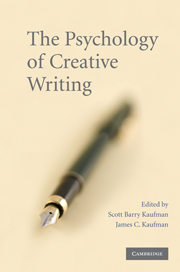Book contents
- Frontmatter
- Contents
- Contributors
- Foreword
- Preface
- Acknowledgments
- PART I THE WRITER
- PART II THE TEXT
- PART III THE PROCESS
- PART IV THE DEVELOPMENT
- PART V THE EDUCATION
- 17 How Rewards and Evaluations Can Undermine Creativity (and How to Prevent This)
- 18 Teaching Writing by Demythologizing Creativity
- 19 Creation and Response: Wellspring to Evaluation
- 20 Fostering Creative Writing: Challenges Faced by Chinese Learners
- 21 Putting the Parts Together: An Integrative Look at the Psychology of Creative Writing
- Index
- References
19 - Creation and Response: Wellspring to Evaluation
Published online by Cambridge University Press: 25 January 2010
- Frontmatter
- Contents
- Contributors
- Foreword
- Preface
- Acknowledgments
- PART I THE WRITER
- PART II THE TEXT
- PART III THE PROCESS
- PART IV THE DEVELOPMENT
- PART V THE EDUCATION
- 17 How Rewards and Evaluations Can Undermine Creativity (and How to Prevent This)
- 18 Teaching Writing by Demythologizing Creativity
- 19 Creation and Response: Wellspring to Evaluation
- 20 Fostering Creative Writing: Challenges Faced by Chinese Learners
- 21 Putting the Parts Together: An Integrative Look at the Psychology of Creative Writing
- Index
- References
Summary
Throughout most of the 20th century, there was often a brutal atmosphere in educational and professional writing circles. The motto governing the general environment in which writers struggled to write was: Real writers can take it! This was a culture in which abuse (ridicule, shaming, expressions of disgust) was often masked as “critique” and hierarchical grading (A to F, or any system that assigns success or failure to creative work) was perceived as corrective. Starting in the 1970s a popular reaction against this brutal culture emerged called “the writing process movement.” It began at a grassroots level as individual teachers invented new ways to teach creative writing even before Peter Elbow's groundbreaking book, Writing without Teachers (1973), brought to academic attention the possibility of a nonhierarchical approach. Such an approach would create a community of peers in which mutual encouragement would replace competitive classroom response and evaluation. Since then, the movement has grown up, earned its own deserved and undeserved backlash, learned from its mistakes, and become mainstream, both in popular books and in academic theory.
Amherst Writers & Artists (AWA) has made a contribution to that history by developing a systematic methodology for the creative writing teacher or workshop leader to use in classrooms and workshops. It has been used at all levels of education – with children in preschool through graduate school, with post-PhD adults, and with a wide range of underserved populations: the homeless, the incarcerated, youth at risk, and many others.
- Type
- Chapter
- Information
- The Psychology of Creative Writing , pp. 316 - 331Publisher: Cambridge University PressPrint publication year: 2009
References
- 1
- Cited by



